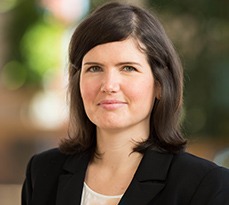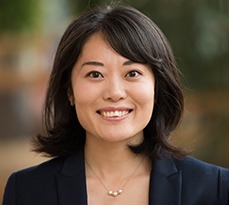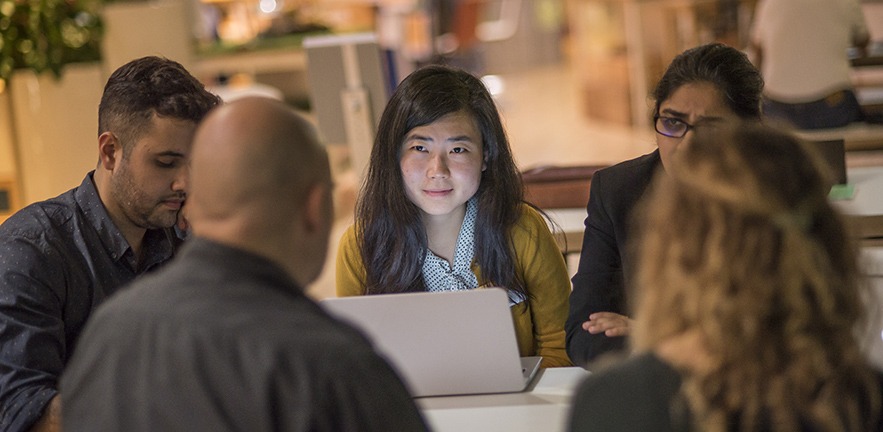We spoke to three Cambridge Judge Business School alumni to find out how they got their roles, the key opportunities to look out for, and their top tips on getting into the sector.
Fast-paced, constantly changing and forever innovating – the tech industry is often hailed as one of the most exciting sectors to work in, and it’s not hard to see why.
One quarter of our most recent Cambridge MBA graduates are currently working in the internet or eCommerce sectors, and 28% of those working in finance are in the fintech industry*. They’ve landed roles with everyone from Google to Meta, Shopee to smaller startups, gaining exposure to one of the most inspiring, innovative, and in-demand sectors out there.
So how did they get there, what trends are they noticing and what tips do they have for current MBA students considering a similar move? We spoke to three of our alumni from Meta, Google, and sustainable startup Infogrid to find out.
Anna Nadalutti (MBA 2017), AR Operations Project Manager, Meta

Graduated from the Cambridge MBA in 2018.
What was your journey into tech and what does your current role at Meta involve?
The MBA helped me to transition into tech with more confidence. After I graduated from Cambridge Judge, I joined a London-based travel-tech startup, working in operations. A year later, I was recruited by Meta to support the Spark AR team, which involves creating strategies to upskill augmented reality creators, grow the augmented reality (AR) industry and get the market ready for the metaverse.
What makes tech an exciting sector to work in?
It’s incredibly exciting because we’re building the future. I work with pioneering technologies that aren’t fully ready yet, but you can already see the impact they will have. My favourite thing about working in the tech industry, though, is the mentality of the people and companies within it. The speed at which things change, the flexible working arrangements and the emphasis on work-life balance and mental health is really inspiring.
Your work focuses on augmented reality and the metaverse. How big do you predict these areas to be in the future and what opportunities are there within it?
Augmented reality has the opportunity to be the next big thing in tech. When the AR glasses are launched, I believe they’ll bring a revolution in our lifestyle as big as the invention of smartphones.
This is the perfect time to get into the space, and all the major tech companies (including Meta, Google, Microsoft, Apple, Snapchat, and TikTok) have dedicated AR teams. In terms of specific roles, opportunities for graduates of the MBA span a variety of areas, from product to programming, partnerships to operations management, so it’s worth being open to different opportunities.
What are the key challenges of working in the industry?
One key challenge is dealing with uncertainty and change. Changing direction to adapt to new data and info is good and necessary when you’re trying to build a product or, as in my case, an industry. But it requires you to be able to adapt quickly to new circumstances, question your past assumptions and strategies, and constantly find a new equilibrium.
What tips do you have for MBA students interested in entering tech more generally?
If you want to work for a big tech company but you’re having difficulty getting recruited, try to find a role as similar as possible to the experience you already have. For example, if you worked in finance, look for a role in Meta’s finance department, just to get a foot in the door.
Once you’re in, changing teams and roles will be much easier, and you’ll be exposed to a variety of internal information and programmes that can help you to make the transition.
Alternatively, look for a temporary contract role first: sometimes these are easier to come by, and you’ll get first-hand experience and make useful contacts.
Another thing to consider if you’re aiming to get a job at a big tech firm is to get some startup experience first. Joining a startup can be easier than passing 6 rounds of interviews for Google or Meta and can allow you to progress your career faster. The experience you get there will be considered very valuable if you do then apply to a bigger tech firm.
Martin Siagian (MBA 2018), APAC Central Strategy Lead, Google

Graduated from the Cambridge MBA in 2019.
What’s your background in tech?
My interest in tech was purely out of curiosity. Around 2016, many of my colleagues in investment banking and consulting started to move into the sector. So, prior to my MBA, I had a period of break from full-time work and managed to secure an internship with one of the tech unicorns. I absolutely loved the experience and from that point on, I was 90% sure I wanted to leave investment banking and move into tech. My year at Cambridge Judge just nudged that up to 100%. I was surrounded by people with tech backgrounds, or people who aspired to be in tech. I landed a role in Google after my MBA and haven’t looked back.
What does your role at Google involve?
I lead APAC-wide strategic efforts around markets, products, and user insights. The objective is to enable Google senior executives in the Asia-Pacific (APAC) region to run the business smoothly, and to help product leads in the US make the best decisions possible for our users and advertisers. It’s a wide remit, but that’s why I like the work.
As more internet users across the world come online, how do you see the industry changing?
In many developing regions globally, we’re seeing more users coming online for the first time, and eventually they will be larger than the first billion internet users altogether. In other words, this “batch” of users is the future of the internet, and we have seen how they interact differently with current internet content and have different needs.
They like visual cues more than text. They like touch screens rather than typing. They never had a bank account, and needed a payment form to shop online, so investments into basic online utilities like fintech and health-tech will likely continue.
What are your top tips for students wanting to get a foot in the door?
The best advice I have is to truly immerse yourself in the tech world, even before you apply for any roles. Network with people in the sector and gather as much knowledge as possible from them. Alumni or colleagues are a great place to start.
Secondly, get involved with tech wherever you can; this could mean many things, such as joining a competition where the case is tech-related, getting a pre-MBA internship, attending tech career sessions, or doing a Cambridge Venture Project (CVP) or Global Consulting Project (GCP) when you’re at Cambridge Judge that’s related to tech topics.
Another tip I have is to be prepared to understand the specifics of the business when you go to an interview. I have sat on both sides of the interview desk and have seen a pattern where MBA students can fall under the “jack of all trades” trap. In my experience, many tech companies are looking for candidates who show they’re a good fit for the role, so for example, if you’re interviewing for a strategy role for a search ads platform, understand how queries turn into monetisable ad clicks, how auction models work, how they impact pricing and so on. MBA students who can master the specifics almost always get the job.
Sayuri Kajiyama (MBA 2017), Senior Product Manager, Infogrid

Graduated from the Cambridge MBA in 2018.
How did the MBA at Cambridge Judge help you to progress your career in tech, and what does your role involve now?
I moved into tech from banking before I started studying at Cambridge Judge, but the MBA gave me a chance to really reflect on my areas of interest and what I wanted to focus on. Cambridge also has an amazing tech scene and startup ecosystem, so I learnt a lot and met some great people.
I’m now working as a product manager at Infogrid – a London-based startup working to make buildings smarter, with a big focus on sustainability.
Where do you think the key opportunities will be in the future?
An area that I think will see more growth is telehealth and remote patient monitoring. The market for this is significant, and the pandemic has caused a surge in interest, including from some major global enterprises.
I can see a growing need for this in countries like Japan, where the population is growing older, and people are struggling to care for their elderly relatives. A key emerging area within telehealth is also mental health services and counselling – there are some really interesting startups in this area.
What other trends should we be looking out for in the coming years?
This might not be specific to tech, but the pandemic really seems to have sped up the move towards flexible working in a lot of companies. The teams I’m working with now are completely distributed – mostly around the UK, but with some team members working in Estonia and Germany too. This means there’s a (slight) time difference, so it’s not always possible to schedule meetings to discuss things. So, we try to do most of our work asynchronously – using tools like Slack, Confluence, Miro/Figma, and G-Suite apps for collaborating on non-code deliverables.
What advice do you have for current MBA students thinking of a career in tech?
There are lots of interesting and key business-side jobs in tech that don’t require a technical background, so if you’re interested in tech as an industry, then I’d say you should just go for any positions that sound interesting to you.
I’d say some common areas that seem to be a good fit for MBA graduates are sales and marketing, operations and product management or strategy, but there are plenty of other areas where MBA alumni could add value too.
My top tip would be to show your curiosity and be proactive in reaching out to people who are in jobs or companies that you want to get into. As you’ll probably find during the MBA, there are many interesting pathways into tech, and you never know what you might be able to learn from someone who’s been in your position.
*As shown in our 2022 employment report.


